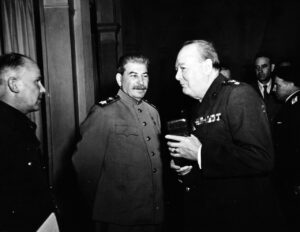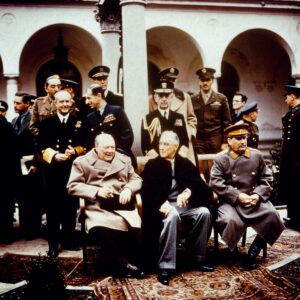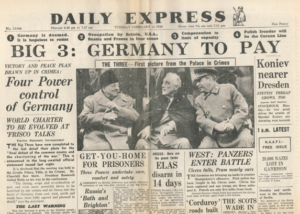Forgotten Friday – The Yalta Conference
In this week’s Forgotten Friday, we are looking at the Yalta Conference and its importance it had in the history of the final defeat and occupation of Nazi Germany.
The Yalta Conference, beginning on 4th February and ending on 11th February 1945 was a major World War Two conference of the three chief Allied leaders—President Franklin D. Roosevelt of the United States, Prime Minister Winston Churchill of Great Britain, and Premier Joseph Stalin of the Soviet Union—which met at Yalta in Crimea to plan the final defeat and occupation of Nazi Germany.[1]

It had already been decided that Germany would be divided into occupied zones administered by U.S., British, French, and Soviet forces. The conferees accepted the principle that the Allies had no duty toward the Germans except to provide minimum subsistence, declared that the German military industry would be abolished or confiscated, and agreed that major war criminals would be tried before an international court, which subsequently presided at Nürnberg. The determination of reparations was assigned to a commission.[2]
How to deal with the defeated or liberated countries of eastern Europe was the main problem discussed at the conference. The agreements reached, which were accepted by Stalin, called for “interim governmental authorities broadly representative of all democratic elements in the population…and the earliest possible establishment through free elections of governments responsive to the will of the people.”
Britain and the United States supported a Polish government-in-exile in London, while the Soviets supported a communist-dominated Polish committee of national liberation in Lublin. Neither the Western Allies nor the Soviet Union would change its allegiance, so they could only agree that the Lublin committee would be broadened to include representatives of other Polish political groups, upon which the Allies would recognize it as a provisional government of national unity that would hold free elections to choose a successor government. Poland’s future frontiers were also discussed but not decided.

After the agreements reached at Yalta were made public in 1946, they were harshly criticized in the United States. This was because, as events turned out, Stalin failed to keep his promise that free elections would be held in Poland, Czechoslovakia, Hungary, Romania, and Bulgaria. Instead, communist governments were established in all those countries, non-communist political parties were suppressed, and genuinely democratic elections were never held.
At the time of the Yalta Conference, both Roosevelt and Churchill had trusted Stalin and believed that he would keep his word[3]. Neither leader had suspected that Stalin intended that all the popular front governments in Europe would be taken over by communists. Roosevelt and Churchill were further inclined to assent to the Yalta agreements because they assumed, mistakenly as it turned out, that Soviet assistance would be sorely needed to defeat the Japanese in the Pacific and Manchuria.

In any case, the Soviet Union was the military occupier of eastern Europe at the war’s end, and so there was little the Western democracies could do to enforce the promises made by Stalin at Yalta. Ultimately, the Yalta conference led to the Potsdam conference which was held in July-August 1945 which solidified the terms of the end of the Second World War.
[1] The Atlantic Charter. United States: Palgrave Macmillan, 1994.
[2] Plokhy, S. M.. Yalta: The Price of Peace. United States: Penguin Publishing Group, 2010.
[3] Roosevelt, Franklin Delano., Churchill, Winston. Roosevelt and Churchill: Their Secret Wartime Correspondence. United States: Saturday Review Press, 1975.
Read more here in detail: https://www.britannica.com/event/Yalta-Conference

